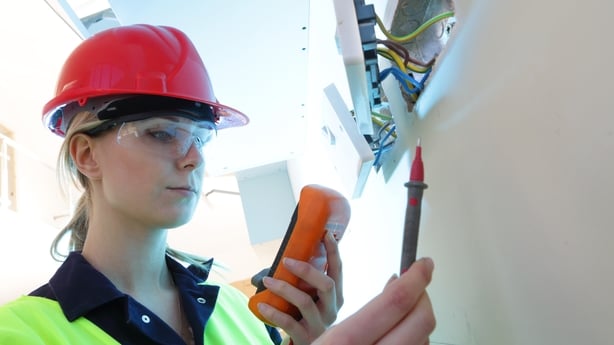The Leaving Cert may seem like a long time ago, but over the next few weeks we have the results, CAO Offers and all the decisions that go with them.
There are many ways to end up in the career you want and the Department of Further and Higher Education, Research, Innovation and Science have shared some great options for further education and training with us.
So, take a breath and whenever you are ready read on...
CAO Options
When you log onto the CAO website, you will see further education choices, apprenticeship choices as well as higher education choices.
This year, students can explore over 1,200 FET courses, including Post-Leaving Cert (PLC) courses via the CAO portal, which is accessible at: cao.ie/options.
The Leaving Cert can be a pathway to your next step in life, but there is a place for you in tertiary education if you want it – whether it be higher education, further education or apprenticeships.
There are so many ways for you to get to where you want to. So, for example; if you've put down science in a University through the CAO, and if you don't get the points, for whatever reason, there are pre-science courses you can do in your local Further Education college that can help you progress to a career in the area of science.
There are so many avenues open to you, education is about opening doors, not closing them. Log onto cao.ie/options to find out more.
So what is…Further Education?
Further Education and Training or FET offers a wide variety of life-long education options to anyone over the age of 16 at Levels One to Six on the National Framework of Qualifications (NFQ).
FET includes, traineeships, Post Leaving Cert (PLC) courses, community education and adult education as well as adult literacy and numeracy services.
There are lots of different courses available for school leavers, available at Levels 5 and 6 of the NFQ including:
- Animal Care (NFQ Level 5)
- Beauty Therapy (NFQ Level 5)
- Bio-pharma (NFQ Level 6)
- Business Studies (NFQ Level 5)
- Carpentry (NFQ Level 5)
- Culinary Arts (NFQ Level 5)
- Early Childhood Care (NFQ Level 5)
- Dance (NFQ Level 5)
- Pre-University Engineering (NFQ Level 5)
- Fashion Design (NFQ Level 5)
- Filmmaking (NFQ Level 5)
- Healthcare Assistant (NFQ Level 5)
- Hospitality (NFQ Level 5)
- Outdoor Activities Instructor (NFQ Level 5)
- Science (NFQ Level 6)
Some of them qualify you for a wide range of specific careers and designed to prepare you for entry to the world of work, while other courses can be useful for progression into higher education. With a course duration of 1-2 years, Post Leaving Certificate programmes can also offer students the opportunity to set their own pace to explore a subject or interest before making a commitment to applying to a four-year degree.
For example, you can do a course in business, law, nursing, or art portfolio as preparation courses. The national website for further education and training options is www.thisisfet.ie where you can see find information on, and apply for, a range of both full and time part time, fully accredited courses.
FET courses and programmes are provided through 16 Education and Training Boards (ETBs) across Ireland which means FET programmes are available in every country county and local communities. Contact your local ETB to find Further Education and Training programmes on offer near you.
Contact your local ETB to find Further Education and Training programmes on offer near you.
Can I start in FET and move on to a university?
Many university programmes have an entry route for students who hold a FET qualification. The entry requirements for each course with a further education entry route are outlined at cao.ie.
You can also undertake a tertiary degree, which is a new kind of programme that allows you to commence your higher education degree course with your local Education and Training Board and graduate from a Higher Education Institution, with dual benefits of both campuses throughout.
This new route means that for the first time in Ireland, you will see guaranteed access – not a lottery – subject to passing exams, to a degree programme that starts in further education and concludes in higher education. Entry to these courses is outside the CAO process and does not rely on points.
You will commence your degree study in the Further Education and Training Campus or College of your local Education and Training Board and complete the first year or two of your studies there, and then progress with guaranteed access to complete the final years of degree studies in higher education. All tertiary degree programmes lead to an NFQ Level 7 Bachelors Degree or a Level 8 Honours Bachelors Degree.
There are tertiary degrees available for September 2024 in a variety of areas including:
- Nursing
- Social work
- Software development
- Media production
- Laboratory Science
Information on these tertiary degree courses can be found on the website of the National Tertiary Office: www.nto.ie.
There you can find information about the courses offered, details on course content, entry requirements, course qualifications and awarding body, location and transport links. Contact details for the course coordinator will be on the course details page if you would like to get more information.
You can also speak with your local ETB Adult Guidance Counsellor and you can access further information HERE.
You can also access FET courses nationally, on the Fetchcourses.ie website, where over 6000 FET courses are open throughout the year.
Additionally, you can find more information on FET courses, stories from learners on FET courses and their careers / learning journey and general news about the sector on www.thisisfet.ie.

What is an Apprenticeship?
An Apprenticeship is a work-based learning. It incorporates a minimum of 50% on-the-job training with off-the-job training. The off-the-job learning ranges from remote or online learning to one day per week or longer duration, typically from 10-20 weeks, in a third level institutions. It varies depending on what apprenticeship you are doing and there is lots of choice.
Apprenticeships last between 2 and 4 years, and lead to qualifications up to PhD level. There are currently 77 different types of apprenticeship programmes. One of the great things about apprenticeship is you can earn money while you learn.
You can become an apprentice in areas such as engineering, agriculture, sport turf management, carpentry, plumbing, electrical, hairdressing, finance, IT, insurance, sales, healthcare, property, recruitment, science and many others once you find an approved apprenticeship employer.
New programmes added in 2024:
- Digital Marketing L6
- Horticulture L6
- Advanced Manufacturing Engineering L8
- Farm Technician L6
- Farm Manager L7
- Social Work L9
- Software Solutions Architect L9
Apprenticeship is for everyone, school-leavers, jobseekers, career changers and those upskilling. You can find out more at apprenticeship.ie and see the full list of options here.
How do I apply for an Apprenticeship?
An apprenticeship is offered on the basis of a contract of employment between the apprentice and their employer.
Apprenticeships are "demand-led". This means that the number of places is determined by how many apprentices employers need.
For example, in the case of craft apprenticeships, this employment may start at any time of year, with subsequent off-the-job training scheduled accordingly throughout the year.
For the consortia-led apprenticeships, this often happens in January and in September/ October of each year, but this can vary from programme to programme, and the application process is usually open all year round.
Check apprenticeship.ie to see what apprenticeship jobs are open for application.
You can also find the contact details of the consortia leads for the newer consortia led apprenticeships who will have details of course structure and may have details of potential interested employers, by clicking on the FAQ-> Find out More section under each listing in the Apprenticeship Directory on the website.

What about student grants?
Student Grants are available to eligible applicants for PLC, Undergraduate and Postgraduate courses.
The Government made changes to the Student Grant Scheme in the last Budget to address the costs of going to college for students and their families.
Students in the 2024/ 25 academic year will see the full benefit of increases to maintenance grants announced in Budget 2024, when the non-adjacent rate of maintenance will increase by €615 and the adjacent rate of maintenance will increase by 10%. These increases already came into effect from January this year on a pro-rata basis.
Also, for the first time since the recession, postgraduate maintenance will be restored on a similar basis to undergraduates, with students already benefitting from this measure since January 2024.
For the coming academic year, the income threshold for Band 4 will increase from €46,790 to €50,840, meaning that more students will be eligible for a maintenance grant, and the income threshold for the 100% Student Contribution will increase from €50,840 to €55,924.
The threshold for the Special Rate of maintenance will also increase from €25,000 to €26,200.
The increase in student earnings outside of term time from €6,552 to €7,925 will also come into effect for the 2024/ 25 academic year.

Can part-time students now get grants too?
On the 1 August, the new Part Time Fee Scheme for Specified Undergraduate Courses was launched, which will be introduced from September 2024.
For the first time, eligible students who are undertaking one of the 62 approved part-time courses under this scheme can now apply for fee support.
All 62 approved courses lead to an undergraduate major award, and both in-person and blended courses are included.
To be eligible for this scheme, you must satisfy various criteria including residency, nationality, and progression, and the income threshold for the scheme is €55,924.
SUSI are administering the Scheme which is now open for applications for funding for the 2024/ 25 academic year.
Students who are on a Social Welfare payment should contact their local Intreo Centre in advance to discuss their individual circumstances if they plan to take up one of these part-time courses.
For more information, and to find out if you what you might be eligible for, go to www.susi.ie.
Other financial supports may also be available for students attending Higher Education and students can check out www.studentfinance.ie for more details.
In addition students who may be concerned about financial supports should contact the access office of the institution they wish to attend who may be in a position to advise them of further support available within the institution.
